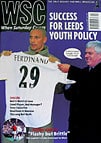 Marcus Christenson examines the past achievements of the next England manager
Marcus Christenson examines the past achievements of the next England manager
Sven-Goran Eriksson’s appointment was met with a barrage of xenophobia in England. In Sweden and elsewhere in Europe, however, the discussion centred on why on earth a top European coach would go anywhere near the mangy Three Lions. It is difficult to imagine Fabio Capello, Hector Cuper, Alberto Zaccheroni or any other successful European coach leaving their clubs to join up with Adam Crozier and co. So why was Eriksson prepared to swap Rome for London?
First, he has never been able to resist a challenge. He left Gothenburg for Portugal as soon as Benfica called and was equally unable to resist Roma’s overtures two years later. In 1997 he had to renege on a verbal agreement with Jack Walker to join Blackburn because a more challenging offer had come along – the chance of winning the Scudetto with Lazio, after finishing second with Roma in 1985, proved too strong. Earlier this year he won the Italian title and, even though the Champions League is still a target, he had fulfilled his main goal and was ready for the next job. There is no doubt that he would have turned England down if he hadn’t won the title in May.
The second reason for Eriksson to accept the England post is to do with his background and upbringing. Elsewhere in Europe, players and managers may treat the Premiership as a place to pick up your last pay cheque, but in Scandinavia English football enjoys unrivalled devotion.
This infatuation is mainly due to a television programme, Tipsextra, which has run since the 1960s, featuring live English football during the domestic season’s winter break. Every Saturday, fans all over Scandinavia religiously sit down with a pools coupon and a can of beer to watch English football while it is cold and dark outside.
“Svennis”, as he is called in Sweden, is no exception. Growing up in a working class home in Torsby, a small village of 5,000 people in the forest county of Värmland in southern Sweden, Eriksson too watched the programme. Later he became a big admirer of the Liverpool side of the Eighties and, while at Benfica, spent a week at Anfield in 1984 to learn from Joe Fagan.
It was two Englishmen, Roy Hodgson and Bob Houghton, both successful in Sweden during the late 1970s and early 1980s, who influenced Eriksson tactically in the early stages of his coaching career. Eriksson quit playing at the age of 27 to become assistant to Tord Grip at Degerfors, then in the Swedish third division.
A year later, Grip left for IFK Gothenburg as Eriksson took over as head coach of Degerfors and and quickly steered them to the first division before himself joining Gothenburg. Eriksson continued to make a name for himself as a coach, starting with Gothenburg’s 1982 UEFA Cup win, while Grip remained largely anonymous.
So he certainly has strong English links, but will that be enough for him to succeed? The view in his home country is invariably that he will make it work – because he is deemed almost infallible. There have, of course, been calls for Eriksson to take over the Swedish national team but he has never been formally approached by the Swedish FA and would probably have said no anyway. The job is not challenging enough and it is widely accepted that he has left Sweden behind him and will never return professionally.
The media in Sweden responded to the news of his England appointment with pride rather than jealousy and anger. The tabloid Aftonbladet said that to be England manager is “the toughest job in the world” but admitted that it was also a “dream job”. But after the euphoria, there was fear. And most of it centred on the attention Eriksson is likely to receive from the English press. “Poor old Svennis,” wrote Aftonbladet’s Lasse Anrell, “I can’t believe he said yes.”
He continued, “How much fun will England be, with its bad weather, over-cooked vegetables and one good player who can deliver a cross, when Svennis’ young Italian girlfriend has grown tired of the Sun’s hooligans, Tord Grip of the worst sort of Daily Star reporters and Svennis of the Daily Express journalists digging in his garbage to find something worth writing about?”
It appears that Eriksson’s only chance of keeping the hacks at bay is to produce results on the pitch. But even if he fails, he is likely to be forgiven for it in his home country.
From WSC 167 January 2001. What was happening this month